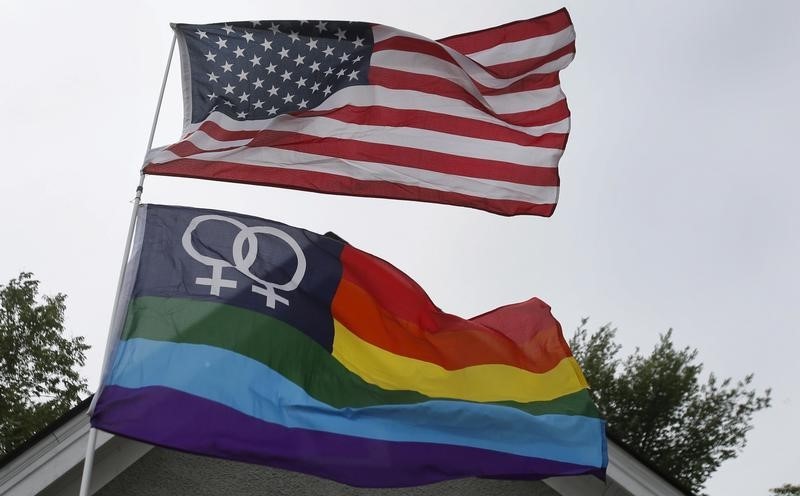By Lawrence Hurley
WASHINGTON (Reuters) - A U.S. Supreme Court case set for argument Monday challenging powerful public-sector unions echoes a very different dispute: The recent battle over gay marriage.
The legal fight pits a small group of teachers and the Christian Educators Association International (CEAI) against the influential California Teachers Association, a union with 325,000 members and a history of backing liberal political causes.
The two groups also were on opposite sides of the 2008 anti-gay marriage Proposition 8 ballot initiative in California, which temporarily blocked same-sex marriage in the state.
The new case could erode labor influence by allowing public workers to stop paying dues to unions, reducing their income and political clout. Such a ruling would apply in 25 states that do not already have "right-to-work" laws, which say workers may not be compelled to join a union.
The lawsuit alleges that California law violates non-union workers' free-speech rights by requiring them to pay "agency fees" toward collective bargaining activities. The 2013 suit highlights the teachers union's involvement in gay rights issues as an example of the type of advocacy some teachers do not want to support.
Rebecca Friedrichs, the lead plaintiff in the case, said in an interview that when teachers saw union-backed advertisements during the Proposition 8 campaign proclaiming teachers' support for gay marriage, some had the same reaction: "Wait a minute. I don't remember giving my permission."
Friedrichs, an experienced elementary school teacher in Anaheim who quit the union in 2012, said she doesn't have a "strong opinion one way or another" on gay marriage but believes the union shouldn't be involved in such issues.
She and the nine other non-union teachers who joined the lawsuit are asking the high court to overturn a 1977 decision that allowed public-sector unions to collect fees from workers who do not want representation, as long as the money is not spent on political activities. The ruling prevented so-called "free riders," non-union workers who benefit from wage and other workplace improvements achieved through collective bargaining without contributing to the union.
A ruling in favor of the teachers would be a blow to organized labor because unionized teachers and other civil servants in states without right-to-work laws comprise its main power base.
Among public sector workers, 35.7 percent belong to unions, compared to 6.6 percent in the private sector, according to the U.S. Bureau of Labor Statistics. Roughly three-quarters of America's estimated 7.2 million public-sector union members are in non-right-to-work states.
If the plaintiffs win, Benjamin Sachs, a professor at Harvard Law School, said he would expect to see more workers stop paying for union representation. "That would create a profound free-rider problem for all public unions," he said.
DIVISION OVER GAY RIGHTS
Six of the teachers that joined the lawsuit are members of CEAI. According to its website, the group "supports the Biblical view of traditional marriage" and criticizes the National Education Association for its "support of the Homosexual Agenda."
In 2008, CEAI was part of a coalition that supported the Proposition 8 campaign to ban gay marriage in California, while the state teachers' union contributed $1.25 million to the unsuccessful effort to defeat the initiative.
CEAI's executive director Finn Laursen said in an interview that left-leaning unions are out of sync with many Christian teachers. Even when political activities are excluded, the California union gives gifts and grants to organizations that are "not in tune" with Christian values, including gay rights groups, he added.
The lawsuit calls out examples of expenses - including a gay and lesbian program and a conference - that the union lists as "chargeable" to its collective bargaining budget, which non-members pay into. It is difficult to distinguish between spending for the union's political activity and its collective bargaining work, said Michael Carvin, the conservative lawyer who will argue the case for the plaintiffs.
"The kind of things they can require plaintiffs to pay for, they are just as important as a matter of public concern and just as ideological as things they can't charge them for. We don't see any real distinction," Carvin said.
In court papers, the union argues that any infringement on free speech is justified by the state's interest in managing employees and, in any event, is ameliorated by allowing non-union workers to opt out of paying for political spending.
The union's president, Eric Heins, defended its political stances, saying in an interview that positions on issues ranging from gay rights to school funding are decided only after an internal democratic process.
"It's a political attack," he said of the lawsuit. "It's nothing to do with improving education for kids."

For graphic : http://graphics.thomsonreuters.com/15/supremecourt16/index.html#section-unions